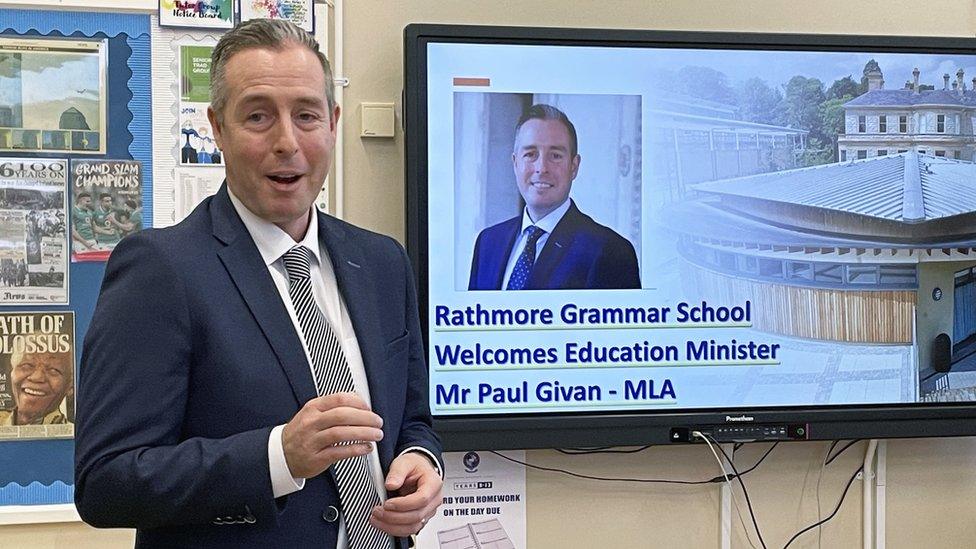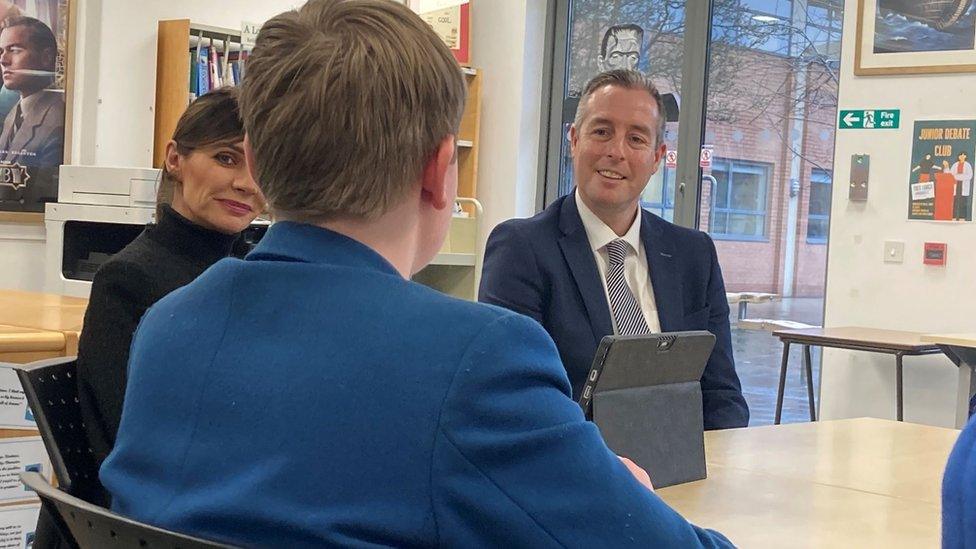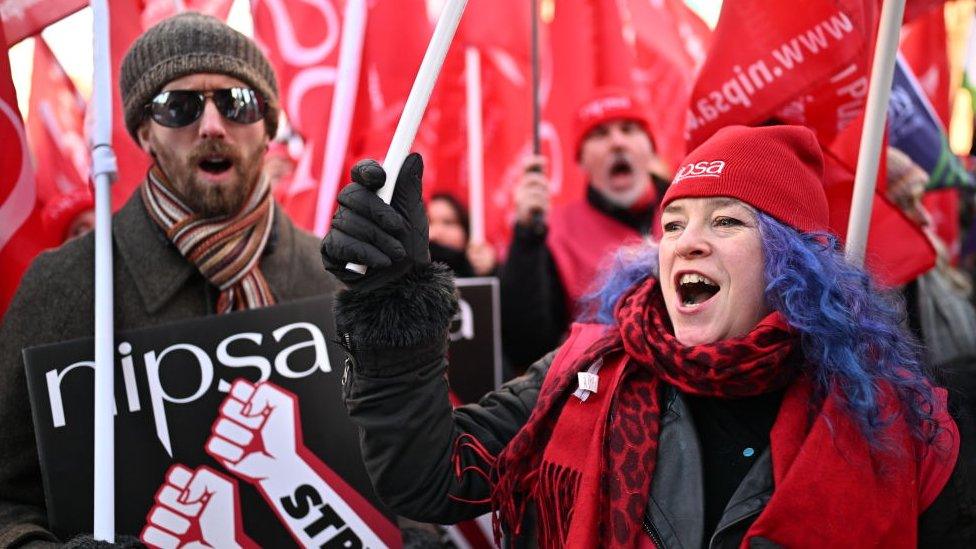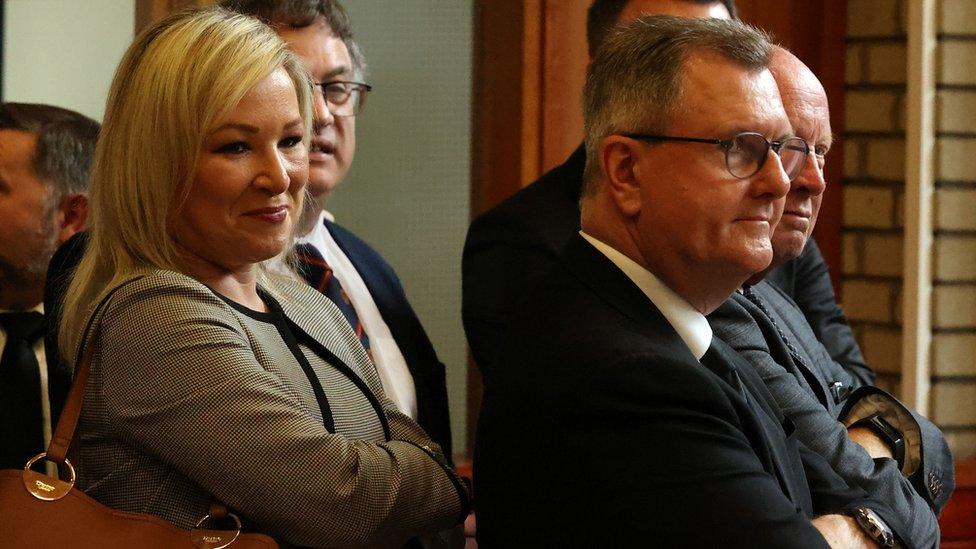Paul Givan: DUP education minister wants to close gap on pay
- Published

Education Minister Paul Givan at Rathmore Grammar School in south Belfast
Stormont's new education minister has said he plans to meet teaching unions next week to discuss calls for better pay.
Paul Givan said he wanted the "gap to close" between wages for school staff in Northern Ireland and their counterparts in Great Britain.
He was speaking as he visited a Catholic grammar school in Belfast.
It was the Democratic Unionist Party (DUP) assembly member's first official ministerial engagement.
In January teaching and non-teaching staff were among the thousands of public sector workers who joined Northern Ireland's biggest strike for decades, calling for better pay and conditions.
The UK government has offered funding to settle public sector pay disputes, but Stormont parties say more money is needed.
Mr Givan said resolving the industrial dispute was his top priority.
"We need to have teachers and non-teachers being properly rewarded for the excellent work that they carry out," he said.
Asked if there would be pay parity between Northern Ireland and Great Britain, he said: "Well, when it comes to closing that gap, I want the gap to close."
He said he would be "making the case" for pay increases but acknowledged there would be "constraints" on the level of funding available to the new power-sharing executive, which was restored last week following a two-year hiatus.
School uniform costs
Mr Givan said he would consider introducing legislation to curb the costs of school uniforms.
But he did not commit to introducing a cap - a measure the DUP said it supported in its 2022 assembly election manifesto.
"The uniform issue is something that I do want to take forward," he said.
"I'll be discussing with officials if a legislative solution is required. We do have very clear guidance whenever it comes to uniform policy that schools should be taking into account.
"But clearly if the guidance isn't being followed, then I need to look at other alternatives to that."

Mr Givan met pupils at the school
Mr Givan also said schools should not be used for "cultural wars" or as a place to "further political ideologies".
He was speaking about a DUP campaign he supported objecting to changes introduced at Westminster last year to relationships and sex education (RSE) in Northern Ireland.
The new regulations make it compulsory for all post-primary schools in Northern Ireland to teach pupils about access to abortion and prevention of early pregnancy.
In a social media post in 2023, Mr Givan said "radicals" were seeking to use the changes to "bring forward their woke agenda".
On Thursday, Mr Givan said the move was "disrespecting the devolution settlement".
He said the DUP campaign objecting to RSE changes was about ensuring "our school environment doesn't become a place for cultural wars to take place".
'Minister for everybody'
Mr Givan's first official visit as education minister was to Rathmore Grammar School - a Catholic school on the outskirts of west Belfast.
The DUP assembly member for Lagan Valley said he was "sending out a very clear statement that I'm here to be a minister for everybody in Northern Ireland".
On Wednesday, the new minister also signalled his support for the Special Educational Needs (SEN) sector, saying children with special needs "should be getting the same education as any other child in mainstream education".
But speaking on the BBC's Nolan Live programme, Mr Givan said the sector faced a "real pressure-point in terms of capacity".
"Even this year alone the department has spent £30m more than what was anticipated in emergency provision and trying to enhance the capacity," he said.
"And going forward, this is going to continue to rise in terms of the numbers, and I'm not talking about hundreds.
"Over the next 10 years the numbers of children that we're projected that is going to need special support is going to rise by thousands and therefore there is a real challenge."
In 2022-23 more than 10,000 children received SEN provision in Northern Ireland but figures show a pattern of rising demand.
Last year, there was a 15% rise in the number of children with a statement of special educational needs (SEN) seeking a school place.
That meant 853 additional pupil places were required in special schools and 400 places were needed in specialist classes within mainstream schools.
Related topics
- Published18 January 2024

- Published3 February 2024
